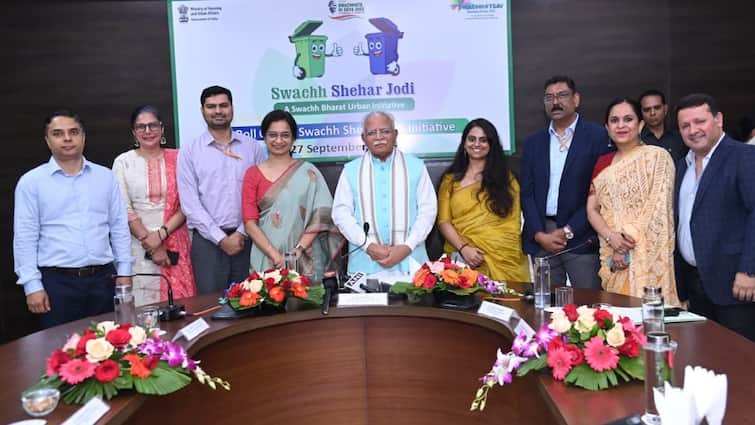In a landmark move to transform urban waste management, the Ministry of Housing and Urban Affairs (MoHUA) has unveiled the Swachh Shehar Jodi (SSJ) initiative, a nationwide mentorship program connecting top-performing cities with those seeking improvement. Nearly 300 cities simultaneously signed Memorandums of Understanding (MoUs) to kickstart this collaborative effort aimed at knowledge transfer, experience sharing, and scaling best practices across urban India.
Launched under the Swachh Bharat Mission – Urban (SBM-U), the initiative pairs 72 mentor cities with around 200 mentee cities, selected based on their performance in the Swachh Survekshan rankings. High-performing cities act as mentors, sharing strategies and insights with lower-ranked cities to improve sanitation outcomes. The formal launch took place at Sonipat, with Union Minister Shri Manohar Lal, MoS MoHUA Shri Tokhan Sahu, Haryana CM Nayab Singh Saini, state urban development ministers, mayors, municipal commissioners, and Secretary MoHUA Shri S. Katikithala in attendance.
Described as one of the largest structured, time-bound mentorship frameworks in urban sanitation, the SSJ initiative seeks to foster collaboration, promote peer learning, and replicate successful practices in waste management and sanitation across cities of all sizes.
Building on the Success of Swachh Survekshan
Over the years, Swachh Survekshan, the world’s largest urban sanitation survey, has highlighted cities that consistently excel despite operational and leadership challenges. These top-performing cities have become benchmarks for excellence, prompting MoHUA to scale their success across other urban centers.
This year, the Super Swachh League was introduced to recognize cities ranked 1st, 2nd, or 3rd across population categories in Swachh Survekshan 2022, 2023, and 2024. By inducting these high achievers, the program aims to encourage cities to aim for aspirational standards while inspiring others to improve their rankings.
Mentor cities include those in the Super Swachh League, the top three in each population category in SS 2024, and promising clean cities emerging from various states and union territories. Mentee cities were selected from the lowest-ranked urban centers in each state, taking geographic proximity into account to facilitate efficient mentorship.
Inclusive, Outcome-Driven Mentorship
Speaking at the Sonipat launch, Union Minister Shri Manohar Lal highlighted the initiative’s focus on Antyodaya—leaving no city behind. He said, “The spirit of Swachh Bharat Mission has always been about building capacity and capabilities for all stakeholders. SSJ is not just a ceremonial partnership; it is a time-bound, outcome-driven initiative. It stands among the largest structured mentorship arrangements in the urban waste management sector.”
Joining virtually, Secretary MoHUA Shri S. Katikithala described SSJ as a dynamic platform for mentoring, knowledge-sharing, and hands-on guidance, stressing that each mentee city should see measurable improvements in sanitation outcomes by learning from its mentor counterpart.
100 Days to Transform Urban Sanitation
On August 26, 2025, MoHUA officially paired mentor and mentee cities and released detailed guidelines for the program. The initiative kicks off a 100-day action plan, during which each mentor–mentee pair will collaborate to set clear milestones, exchange best practices, and develop actionable solutions tailored to the mentee city’s unique challenges.
MoHUA will oversee the program, providing strategic direction, policy guidance, and capacity-building support to ensure meaningful impact. The success of this mentorship-driven model will be assessed during Swachh Survekshan 2026, setting the stage for the next wave of urban transformation.
With nearly 300 MoUs signed in one day, SSJ marks a historic effort to create a collaborative, peer-driven, and results-oriented framework for urban waste management—a bold step toward cleaner, healthier cities across India.



